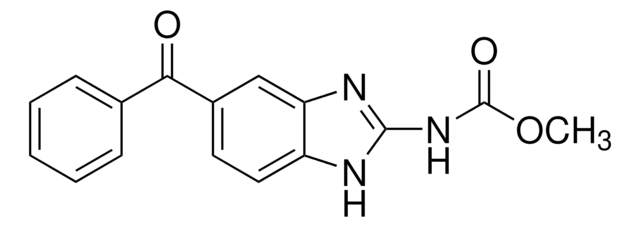1012553
USP
Albendazole
United States Pharmacopeia (USP) Reference Standard
Synonym(s):
Methyl 5-(propylthio)-2-benzimidazolecarbamate
About This Item
Recommended Products
grade
pharmaceutical primary standard
API family
albendazole
manufacturer/tradename
USP
application(s)
pharmaceutical (small molecule)
format
neat
SMILES string
CCCSc1ccc2[nH]c(NC(=O)OC)nc2c1
InChI
1S/C12H15N3O2S/c1-3-6-18-8-4-5-9-10(7-8)14-11(13-9)15-12(16)17-2/h4-5,7H,3,6H2,1-2H3,(H2,13,14,15,16)
InChI key
HXHWSAZORRCQMX-UHFFFAOYSA-N
Looking for similar products? Visit Product Comparison Guide
General description
Application
- Albendazole Oral Suspension
- Albendazole Tablets
Analysis Note
Other Notes
related product
Signal Word
Warning
Hazard Statements
Precautionary Statements
Hazard Classifications
Aquatic Acute 1 - Aquatic Chronic 1 - Repr. 2 - STOT RE 2 Oral
Target Organs
Adrenal gland,Blood,male reproductive organs,spleen
Storage Class Code
11 - Combustible Solids
WGK
WGK 3
Flash Point(F)
Not applicable
Flash Point(C)
Not applicable
Certificates of Analysis (COA)
Search for Certificates of Analysis (COA) by entering the products Lot/Batch Number. Lot and Batch Numbers can be found on a product’s label following the words ‘Lot’ or ‘Batch’.
Already Own This Product?
Find documentation for the products that you have recently purchased in the Document Library.
Customers Also Viewed
Our team of scientists has experience in all areas of research including Life Science, Material Science, Chemical Synthesis, Chromatography, Analytical and many others.
Contact Technical Service










